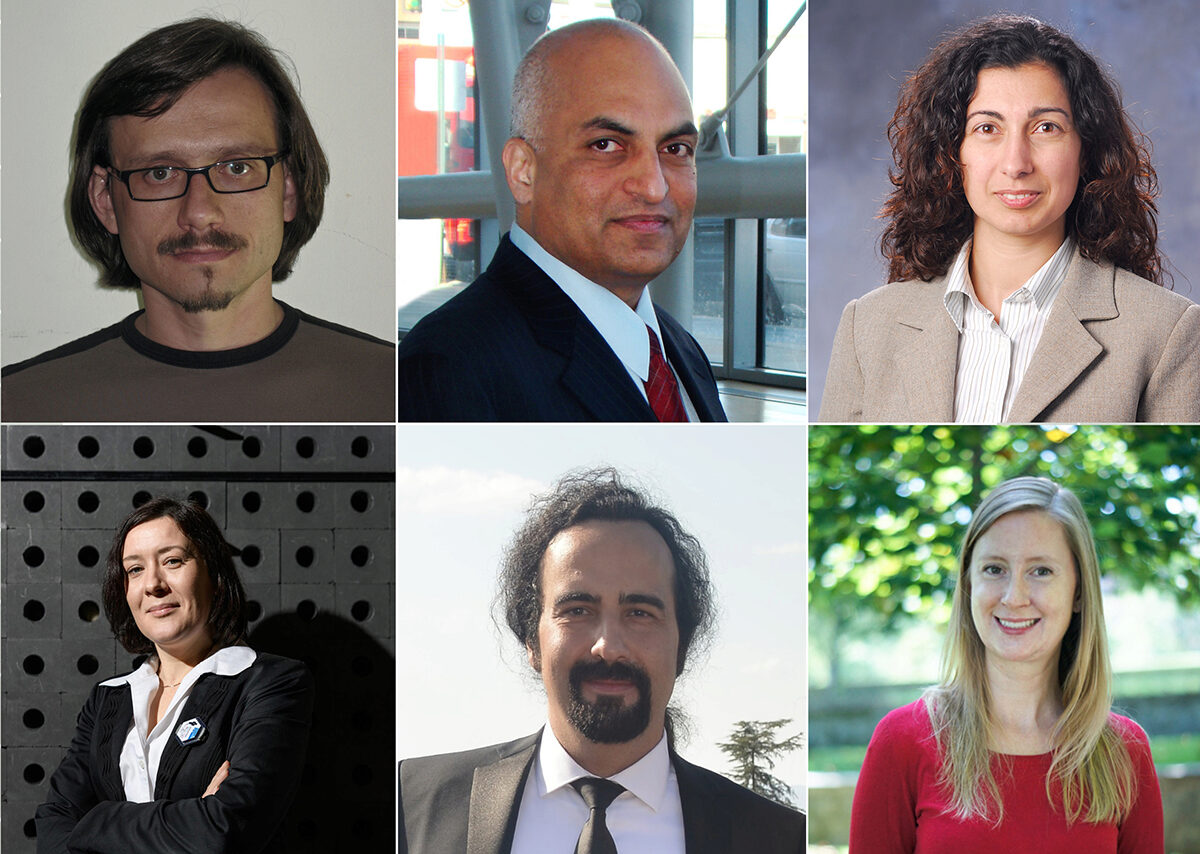
Six faculty members from the George W. Woodruff School of Mechanical Engineering have been appointed chairs and named professors, effective July 1, 2019.
Andrei Fedorov and Surya Kalidindi have been appointed Rae S. and Frank H. Neely Chairs and Kyriaki Kalaitzidou has been named a Rae S. and Frank H. Neely Professor. In addition, Anna Erickson, Alper Erturk and Susan Thomas have been named new Woodruff Professors. Selection for the professorships is based on research accomplishments, leadership, and contributions made to Georgia Tech and the Woodruff School. Each faculty member will receive funding to support their research activities during the five-year, renewable term.
The Neely Visiting Professorship Fund was established by Rae S. and Frank H. Neely In 1960 and later became the Neely Professorship Endowment Fund in 1988. The fund supports faculty positions that most appropriately meet the needs of the school, such as director's chairs; faculty chairs; professors of the practice; professorships and early career professorships. The Fund enhances the Woodruff School’s ability to attract and retain eminent teacher-scholars to positions of academic leadership. Frank H. Neely, business and civic leader in Atlanta, graduated from Georgia Tech in 1904. His ties to Tech remained strong throughout his life, and his philanthropy is visible throughout campus.
The Woodruff Professorships are funded through the generosity of the George W. Woodruff Trust, which was established in 1988. George W. Woodruff received his degree in mechanical engineering in 1917. He served as a trustee and trustee emeritus of the Georgia Tech Foundation from 1941 until his death at the age of 91 in 1987, and he received the Alumni Distinguished Service Award in 1963. In addition to providing a significant endowment for the School of Mechanical Engineering, his contributions to Georgia Tech provide National Merit Scholarships and scholarships for student athletes in nonrevenue producing sports and are an ongoing source of unrestricted support for the Institute.
Dr. Fedorov's background is in thermal/fluid sciences, chemical reaction engineering as well as in applied mathematics. His laboratory works at the intersection between mechanical and chemical engineering and solid state physics and analytical chemistry with the focus on portable/distributed power generation with synergetic CO2 capture; thermal management of high power dissipation devices and electronics cooling; special surfaces and nanostructured interfaces for catalysis, heat and moisture management; and development of novel bioanalytical instrumentation and chemical sensors. Dr. Fedorov joined Georgia Tech in 2000 as an Assistant Professor after finishing his postdoctoral work at Purdue University.
Dr. Kalidindi's research interests are broadly centered on designing material internal structure (including composition) for optimal performance in any selected application and identifying hybrid processing routes for its manufacture. To this end, he has employed a harmonious blend of experimental, theoretical, and numerical approaches in his research.
Dr. Kalaitzidou joined Georgia Tech as an Assistant Professor in the Woodruff School in November of 2007. She also holds an adjunct appointment in the School of Materials Science and Engineering. She obtained her Ph.D. in manufacturing and characterization of polymer nanocomposites (PNCs) from Michigan State University and worked as a post-doctoral researcher on mechanics of soft materials in the Polymer Science and Engineering Department at University of Massachusetts, Amherst. Dr. Kalaitzidou’s work focuses on utilizing the unique properties of nanomaterials by using them i) for manufacturing of multifunctional PNCs with advanced performance and ii) as coolants/lubricants in conventional machining processes.
Dr. Erickson is a leader of Advanced Laboratory for Nuclear Nonproliferation and Safety and an Assistant Professor of Nuclear & Radiological Engineering in the Woodruff School. She received her MS and PhD from Massachusetts Institute of Technology, where she was a NNSA’s Stewardship Science Graduate Fellow. Prior to her position at Georgia Tech, she was a postdoctoral researcher at the Advanced Detectors Group at Lawrence Livermore National Laboratory. Dr. Erickson's research focuses on advanced nuclear reactor design and nuclear security and nonproliferation, connected by the current need for proliferation-resistant nuclear power. Her group is involved in large-array imaging applications for homeland security, antineutrino detection and nuclearized robotics for safety and security applications.
Dr. Erturk began at Georgia Tech in May 2011 as an Assistant Professor, he was promoted to Associate Professor with tenure in 2016 and became a full Professor in 2019. Prior to joining Georgia Tech, he worked as a Research Scientist in the Center for Intelligent Material Systems and Structures at Virginia Tech (2009-2011). His postdoctoral research interests included theory and experiments of smart structures for applications ranging from aeroelastic energy harvesting to bio-inspired actuation. His Ph.D. dissertation (2009) was centered on experimentally validated electromechanical modeling of piezoelectric energy harvesters using analytical and approximate analytical techniques. Prior to his Ph.D. studies in Engineering Mechanics at Virginia Tech, Dr. Erturk completed his M.S. degree (2006) in Mechanical Engineering at METU with a thesis on analytical and semi-analytical modeling of spindle-tool dynamics in machining centers for predicting chatter stability and identifying interface dynamics between the assembly components.
Dr. Thomas joined Georgia Tech in November 2011 as an Assistant Professor. Prior to this appointment, she was a Whitaker postdoctoral scholar at École Polytechnique Fédéral de Lausanne (one of the Swiss Federal Institutes of Technology) developing nanomaterials for cancer immunotherapy and studying the role of lymphatic transport in immunity. Dr. Thomas received her Ph.D. from The Johns Hopkins University as a NSF Graduate Research Fellow where she studied the role of fluid flow in regulating blood-borne metastasis and identified novel biomarkers for the detection of metastatic colon cancers. Dr. Thomas’s research focuses on the role of biological transport phenomena in physiological and pathophysiological processes.